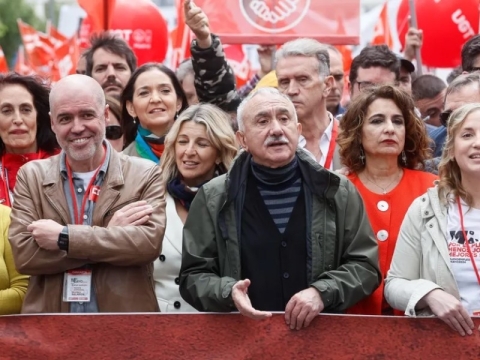News
Spanish unions demand a reduction in working hours
Criticize the autocratic drift of the US
USPA NEWS -
May 1st was celebrated across Europe with demonstrations, as tradition dictates on International Workers' Day. In Spain, unions called for people to take to the streets with several demands, especially the reduction of the maximum legal working week to 37.5 hours per week. The two largest Spanish unions, Comisiones Obreras and the Unión General de Trabajadores (UGT), called for more than 50 demonstrations across the country, the main one led in Madrid by their general secretaries, Unai Sordo and Pepe Álvarez, respectively. The demonstration began at noon along the capital's Gran Vía and ended with a rally in Plaza de España.
The May 1st demonstration in Madrid was marked by the demand for a reduction of the working week to 37.5 hours per week, which will be approved by the Council of Ministers next Tuesday. The reform of dismissal laws in Spain to adapt them to the European Social Charter and an international context marked by the arrival of Donald Trump at the White House. After touring the center of the capital, thousands of people listened to the speeches of the Secretary General of Comisiones Obreras, Unai Sordo, and the Secretary General of UGT, Pepe Álvarez, who agreed to call on political parties to approve the reduction of working hours in the Parliament. Failure to do so, they warned, would be a "swindle to democracy."
That the agreement to reduce the working day to 37.5 hours in 2025 be fulfilled, that a social dialogue table be opened to reform dismissal laws in Spain, and that we keep a society alert, which must safeguard democracy and the rule of law in the face of the international wave of far-right populism that, in the words of Unai Sordo, Secretary General of Comisiones Obreras, "is led by that little man Donald Trump." Under the slogan "Protecting what has been achieved, winning the future," the union once again put work and its central role in 21st-century societies at the center.
A broad representation of the central government also attended the Madrid demonstration, led by the Second Vice President and Minister of Labor, Yolanda Díaz. At her side were the Minister of Inclusion, Social Security, and Migration, Elma Saiz; the Minister for Digital Transformation, Óscar López; the Minister of Youth and Children, Sira Rego; and the Minister of Health, Mónica García.
This May Day was planned as a call for shorter working hours and other core issues for the confederal and organized union movement represented by Comisiones Obreras. However, given the tariff situation resulting from United States trade policies, the May Day mobilization had the most global implications in the last 100 years.
After reaffirming the solidarity of the Workers' Commissions with the Sahrawi people, Unai Sordo did not ignore the controversy over arms purchases from Israel. He maintained that "we must cancel contracts with Israeli arms companies and break with the Zionist state while the inhumane genocide of the Palestinian people continues." He also had a thought for the thousands of trade unionists around the world who are still attacked, persecuted, and murdered. The Secretary General, who has been repeatedly asked why the emphasis has been placed on the global dimension, replied from the platform prepared in Madrid's Plaza de España: "The United States is heading toward autocracy. We are moving toward a model that is hardly comparable to a conventional liberal democracy. This is about a man who has decided to take the world by storm and break trade rules, like a bully in a playground. It's a breach of multilateralism."
Liability for this article lies with the author, who also holds the copyright. Editorial content from USPA may be quoted on other websites as long as the quote comprises no more than 5% of the entire text, is marked as such and the source is named (via hyperlink).






